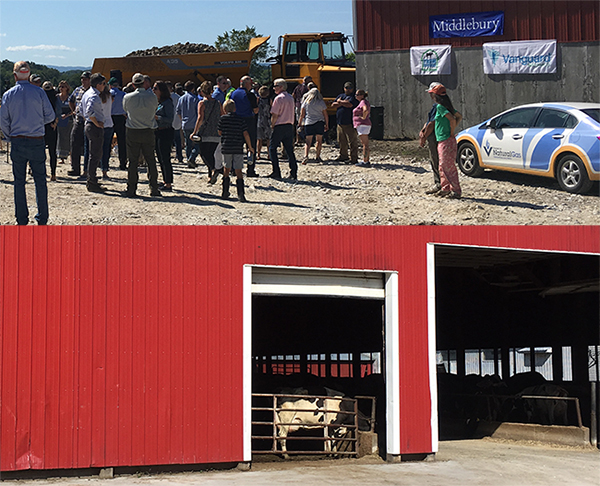 On August 20th, SRH Law’ client Vanguard Renewables celebrated the official groundbreaking of its new biodigester project, to be located at the Goodrich Farm in Salisbury, Vermont. The groundbreaking followed the Vermont Public Utility Commission’s approval of the project in March (the Commission had approved an earlier configuration of the biodigester facility in 2016 that was proposed by a different developer). The biodigester will utilize farm and food waste as the feedstock to generate renewable natural gas, or RNG.
On August 20th, SRH Law’ client Vanguard Renewables celebrated the official groundbreaking of its new biodigester project, to be located at the Goodrich Farm in Salisbury, Vermont. The groundbreaking followed the Vermont Public Utility Commission’s approval of the project in March (the Commission had approved an earlier configuration of the biodigester facility in 2016 that was proposed by a different developer). The biodigester will utilize farm and food waste as the feedstock to generate renewable natural gas, or RNG.
Construction is expected to be completed in 2020.
Andy Raubvogel and his colleagues at SRH Law provided comprehensive legal services to Vanguard for permitting and other aspects of the project, and VHB provided consulting services on all environmental matters.
This facility will be the first commercial biodigester in Vermont to produce RNG, and the largest anaerobic biodigester east of the Mississippi River. The biodigester will repurpose 30,000 tons of manure per year from 900 dairy cows at the Goodrich Farm, and 5,000 tons of “source-separated organics” per year derived from commercial food operations, grocery stores, schools and institutions, dairy processing waste, possibly brewery waste, and other similar sources. Vanguard has five other biodigester facilities in Massachusetts, all of which utilize farm and food waste for MW-scale electricity production.
The annual output of the Salisbury facility will be 172,000 Mcf (million cubic feet) of RNG, which is equivalent to the amount of natural gas used by 1,911 average homes in VT (90 Mcf per home per year). The RNG will be sold to Vermont Gas, who will make the RNG available to its customers through its RNG Program, and to Middlebury College, helping the institution reach its sustainability goals.
Vermont has a statewide goal of sourcing 90% of all energy from renewable sources by 2050, and this project is an important development in the renewable energy field that will have a number of tangible environmental benefits—minimizing CO2 emissions, helping to control phosphorous runoff to Lake Champlain, and diverting food waste from landfills.
